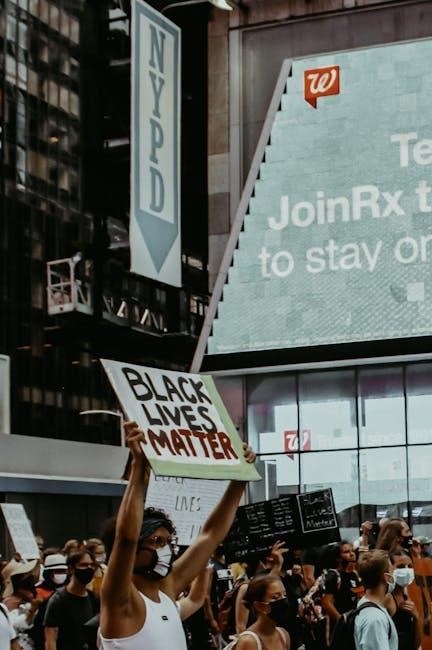social justice fallacies pdf
Social justice fallacies involve flawed reasoning that undermines discussions on equality and fairness․ Recognizing these errors is crucial for promoting constructive dialogue and equitable solutions․
1․1 Definition and Overview
Social justice fallacies are flawed arguments or reasoning patterns that distort discussions on equality‚ fairness‚ and systemic issues․ These fallacies often arise from emotional appeals‚ oversimplifications‚ or misrepresentations of opposing views․ They can hinder progress by creating misunderstandings and polarization․ Understanding these fallacies involves identifying common errors like appeal to emotion or straw man arguments‚ which are frequently used in debates about race‚ gender‚ and economic inequality․ Recognizing these patterns is essential for fostering constructive dialogue and equitable solutions․
1․2 Importance of Understanding Fallacies in Social Justice Discourse
Understanding fallacies in social justice discourse is vital for promoting clarity and effectiveness in advocating for equality․ Fallacies often lead to miscommunication‚ polarization‚ and ineffective policies․ By identifying flawed reasoning‚ individuals can address issues more constructively‚ fostering empathy and collaboration․ This critical awareness ensures that discussions remain grounded in evidence and logic‚ rather than emotion or misinformation․ It empowers advocates to create meaningful change while maintaining respectful and open dialogue․
Common Logical Fallacies in Social Justice Arguments
Social justice arguments often involve fallacies like emotional appeals‚ straw men‚ and false dichotomies․ These errors can distort discussions‚ leading to polarization and ineffective solutions․
2․1 Appeal to Emotion
Appeal to emotion is a common fallacy in social justice arguments‚ where emotional narratives replace logical reasoning․ This tactic manipulates feelings rather than addressing facts‚ often leading to irrational conclusions․ By evoking sympathy or anger‚ it bypasses critical thinking‚ making discussions vulnerable to bias․ Recognizing this fallacy is essential to ensure arguments are grounded in evidence and not emotional manipulation․ It undermines the credibility of social justice claims when logic is overshadowed by emotional appeals․ Addressing this fallacy promotes more objective and constructive discourse․
2․2 Straw Man Argument
A straw man argument distorts an opponent’s position to make it easier to attack․ In social justice debates‚ this fallacy often involves misrepresenting someone’s stance as extreme or simplistic․ By creating a caricature of the original argument‚ it shifts focus from the actual issue to a weakened version․ This tactic undermines constructive dialogue and fosters polarization․ Recognizing straw man arguments is vital to engaging with opposing views fairly and addressing the real concerns at hand‚ ensuring discussions remain grounded in accuracy and respect․
2․3 False Dichotomy
A false dichotomy presents a situation as having only two opposing options when‚ in reality‚ there are more possibilities․ In social justice debates‚ this fallacy often oversimplifies complex issues‚ such as framing discussions on equality as a choice between absolute meritocracy or total equity․ By limiting the narrative to extremes‚ it ignores nuanced solutions and fosters polarization․ This fallacy discourages comprehensive understanding and can lead to policies that fail to address the full spectrum of societal needs‚ perpetuating inequality rather than resolving it․
2․4 Ad Hominem Attacks
Ad hominem attacks involve discrediting an argument by targeting the character or personal traits of the person making it‚ rather than addressing the argument itself․ In social justice discussions‚ this fallacy often manifests as labeling opponents with derogatory terms like “bigot” or “social justice warrior․” Such attacks divert attention from the issue at hand‚ hinder constructive debate‚ and create a toxic environment where meaningful dialogue is stifled․ This undermines the pursuit of equity and fosters division instead of understanding and progress․

The Impact of Fallacies on Social Justice Discussions
Fallacies in social justice debates often lead to polarization‚ hinder constructive dialogue‚ and result in misleading narratives that shape ineffective policies and public perceptions․
3․1 Polarization and Division
Social justice fallacies often exacerbate polarization by oversimplifying complex issues‚ fostering “us versus them” mentalities․ Fallacious arguments‚ like labeling opponents as immoral‚ deepen divisions․ For instance‚ the straw man fallacy misrepresents opposing views‚ while ad hominem attacks distract from substantive debate․ Such tactics alienate potential allies and entrench conflicting viewpoints․ This polarization hinders collaboration‚ turning discussions into ideological battles rather than constructive exchanges aimed at understanding and progress․ The result is a fragmented society where empathy and common ground are increasingly elusive․
3․2 Undermining Constructive Dialogue
Social justice fallacies often hinder meaningful dialogue by shifting focus away from the issue at hand․ Fallacious reasoning‚ such as emotional appeals or straw man arguments‚ can frustrate constructive exchange․ When discussions are derailed by ad hominem attacks or false dichotomies‚ participants become defensive or disengage․ This undermines the potential for mutual understanding and collaboration․ Fallacies create barriers to open communication‚ making it difficult to address complexities and find common ground․ As a result‚ discussions become less productive and more divisive․
3․3 Misleading Narratives and Policies
Social justice fallacies often distort reality‚ leading to misleading narratives that shape public opinion and policy․ Fallacious reasoning‚ such as false dichotomies or emotional appeals‚ can oversimplify complex issues‚ creating a skewed perception of inequality or injustice․ This misrepresentation can result in policies that address symptoms rather than root causes or inadvertently harm the groups they aim to support․ By perpetuating flawed arguments‚ fallacies contribute to ineffective solutions and further entrench societal divides‚ highlighting the need for critical analysis in policymaking․

Critical Thinking and Fallacy Identification
Critical thinking enables the recognition and analysis of fallacies in social justice arguments‚ fostering effective identification and refutation of flawed reasoning through skill development and analytical tools․
4․1 Developing Critical Thinking Skills
Developing critical thinking skills is essential for identifying and addressing fallacies in social justice discussions․ Education plays a key role in fostering these skills‚ enabling individuals to analyze arguments objectively․ By learning to evaluate evidence‚ identify biases‚ and recognize logical inconsistencies‚ people can engage more effectively in discussions․ Critical thinking also involves self-reflection and open-mindedness‚ allowing for the consideration of diverse perspectives․ These skills are vital for navigating complex social issues and promoting informed‚ equitable decision-making in society․
4․2 Tools for Analyzing Arguments
Effective analysis of arguments in social justice discourse requires specific tools․ Argument mapping helps visualize the structure of claims‚ identifying strengths and weaknesses․ Checklists for fallacies‚ such as appeal to emotion or straw man arguments‚ provide a framework for evaluation․ Additionally‚ evidence-based reasoning tools ensure claims are supported by credible data․ These methods enhance critical thinking‚ enabling individuals to distinguish between valid and flawed arguments‚ fostering more informed and equitable discussions in social justice contexts․

Addressing and Refuting Fallacies in Social Justice
Educating individuals on logical fallacies and fostering open dialogue can refute misleading arguments‚ promoting fact-based discussions and equitable solutions in social justice debates․
5․1 Education and Awareness
Educating individuals about logical fallacies is essential for fostering critical thinking in social justice discussions․ By understanding common fallacies like ad hominem and straw man arguments‚ people can identify flawed reasoning and engage more effectively in debates․ Awareness campaigns and educational resources‚ such as the “Social Justice Fallacies” PDF‚ provide tools to recognize and refute misleading narratives․ This empowerment enables individuals to advocate for equity based on facts rather than emotional manipulation or false dichotomies․
5․2 Promoting Open Dialogue
Encouraging open dialogue is vital for addressing social justice fallacies․ By creating spaces where diverse perspectives are heard‚ individuals can challenge assumptions and explore issues collaboratively․ This approach reduces polarization and fosters mutual understanding․ Resources like the “Social Justice Fallacies” PDF emphasize the importance of respectful communication‚ helping to dismantle echo chambers and promote constructive debates․ Open dialogue not only enhances critical thinking but also strengthens collective efforts toward equitable solutions․
5․3 The Role of Media and Technology
Media and technology play a dual role in shaping social justice discussions․ While they amplify voices and spread information‚ they also facilitate the dissemination of fallacies․ The “Social Justice Fallacies” PDF highlights how platforms can perpetuate misinformation․ However‚ technology also offers tools for critical thinking‚ such as fact-checking websites and educational resources․ By leveraging these tools‚ individuals can identify and refute fallacies․ Additionally‚ media literacy programs can empower people to engage more thoughtfully with online content‚ fostering a more informed and nuanced public discourse on social justice issues․
Case Studies and Real-World Examples
Historical and modern examples illustrate how social justice fallacies manifest in real-world scenarios‚ highlighting their impact on discourse and policy‚ as detailed in the PDF․
6․1 Historical Examples of Fallacious Reasoning
Historical examples reveal how fallacious reasoning has shaped social justice debates․ For instance‚ Dr․ Thomas Sowell’s work highlights how arguments for equality often overlook merit‚ leading to misguided policies․ The book Social Justice Fallacies examines past discourse‚ showing how emotional appeals and straw man arguments have derailed constructive conversations․ These historical cases demonstrate the dangers of logical fallacies in promoting equitable solutions‚ emphasizing the need for critical analysis in understanding their impact on societal progress and policy development․
6․2 Modern-Day Applications in Social Media
6․2 Modern-Day Applications in Social Justice
Modern social media platforms amplify fallacies in social justice discourse‚ spreading misinformation rapidly․ False dichotomies and ad hominem attacks are prevalent‚ often overshadowing nuanced discussions․ For instance‚ labels like “Social Justice Warrior” are used to dismiss perspectives‚ fostering polarization․ Platforms like Twitter and TikTok enable the viral spread of oversimplified or hostile content‚ reducing complex issues to binary debates․ This trend undermines constructive dialogue‚ highlighting the need for critical engagement to address fallacies effectively in digital spaces and promote meaningful societal progress․

The Broader Implications of Social Justice Fallacies
Social justice fallacies perpetuate systemic inequality‚ erode trust in institutions‚ and hinder progress toward true equity․ Addressing these fallacies is vital for fostering a just society․
7․1 Societal Consequences
Social justice fallacies contribute to societal polarization‚ eroding trust in institutions and fostering division․ They often perpetuate systemic inequalities‚ misleading narratives‚ and ineffective policies․ By undermining constructive dialogue‚ these fallacies hinder progress toward equity and justice‚ disproportionately affecting marginalized communities․ Addressing them requires a collective effort to promote critical thinking and inclusive discourse‚ ensuring that societal advancements are rooted in factual understanding rather than flawed reasoning․
7․2 The Role of Academia and Research
Academia plays a pivotal role in identifying and addressing social justice fallacies․ Through rigorous research‚ scholars can expose flawed reasoning and promote evidence-based discourse․ Educational institutions should prioritize critical thinking and media literacy to equip students with tools to analyze arguments effectively․ By fostering interdisciplinary collaboration‚ academia can develop frameworks that counter fallacious narratives‚ ensuring that social justice efforts are grounded in empirical evidence and ethical considerations․ This fosters a more informed and equitable society․
Addressing social justice fallacies requires education‚ critical thinking‚ and open dialogue․ Advocate for evidence-based discussions to foster a more equitable and informed society for all․
8․1 The Importance of Critical Engagement
Critical engagement is vital in identifying and addressing social justice fallacies․ By actively questioning assumptions and seeking evidence‚ individuals can promote reasoned discourse and challenge flawed arguments․ This approach fosters a deeper understanding of complex issues‚ encouraging empathy and reducing polarization․ Critical engagement not only enhances personal judgment but also strengthens collective efforts toward justice and equality‚ ensuring that discussions remain grounded in reality rather than emotion or misinformation․ It empowers individuals to contribute meaningfully to societal progress․
8․2 Moving Forward: Strategies for Improvement
Addressing social justice fallacies requires a multifaceted approach․ Education and awareness campaigns can equip individuals with critical thinking tools‚ enabling them to recognize and refute flawed arguments․ Encouraging open‚ respectful dialogue fosters collaboration and reduces division․ Additionally‚ leveraging technology and media to promote fact-based narratives can counter misinformation․ By implementing these strategies‚ society can move toward more informed and equitable discussions‚ ensuring that social justice efforts are rooted in logic and evidence rather than fallacious reasoning․
